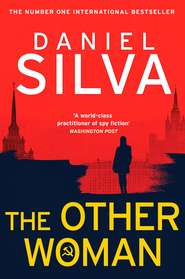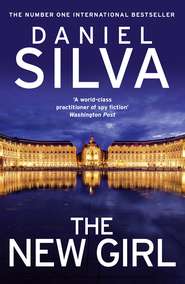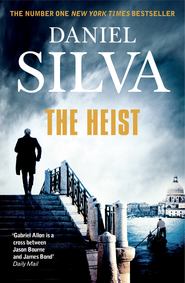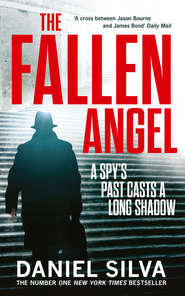По всем вопросам обращайтесь на: info@litportal.ru
(©) 2003-2024.
✖
The English Spy
Автор
Год написания книги
2018
Настройки чтения
Размер шрифта
Высота строк
Поля
“What will you make us tomorrow night?” asked the former princess.
“It’s a surprise,” he replied in his peculiar accent.
“Oh, good,” she said, fixing him with the same smile he had seen on countless magazine covers. “I do like surprises.”
They were a small crew, eight in all, and it was the responsibility of the chef and his assistant to see to the china, the stemware, the silver, the pots and pans, and the cooking utensils. They stood side by side at the basin long after the former princess and her companions had turned in, their hands occasionally touching beneath the warm soapy water, her bony hip pressing against his thigh. And once, as they squeezed past one another in the linen cabinet, her firm nipples traced two lines across his back, sending a charge of electricity and blood to his groin. They retired to their cabins alone, but a few minutes later he heard a butterfly tap at his door. She took him without a sound. It was like performing the act of love with a mute.
“Maybe this was a mistake,” she whispered into his ear when they had finished.
“Why would you say that?”
“Because we’re going to be working together for a long time.”
“Not so long.”
“You’re not planning to stay?”
“That depends.”
“On what?”
He said nothing more. She laid her head on his chest and closed her eyes.
“You can’t stay here,” he said.
“I know,” she answered drowsily. “Just for a little while.”
He lay motionless for a long time after, Amelia List sleeping on his chest, the Aurora rising and falling beneath him, his mind working through the details of what was to come. Finally, at three o’clock, he eased from the berth and padded naked across the cabin to the cupboard. Soundlessly, he dressed in black trousers, a woolen sweater, and a dark waterproof coat. Then he removed the wrapper from the parcel—the parcel measuring twelve inches by twenty and weighing sixteen pounds precisely—and engaged the power source and the timer on the detonator. He returned the parcel to the cupboard and was reaching for the Stechkin pistol when he heard the girl stir behind him. He turned slowly and stared at her in the darkness.
“What was that?” she asked.
“Go back to sleep.”
“I saw a red light.”
“It was my radio.”
“Why are you listening to the radio at three in the morning?”
Before he could answer, the bedside lamp flared. Her eyes flashed across his dark clothing before settling on the silenced gun that was still in his hand. She opened her mouth to scream, but he placed his palm heavily across her face before any sound could escape. As she struggled to free herself from his grasp, he whispered soothingly into her ear. “Don’t worry, my love,” he was saying. “It will only hurt a little.”
Her eyes widened in terror. Then he twisted her head violently to the left, severing her spinal cord, and held her gently as she died.
It was not the custom of Reginald Ogilvy to stand the lonely hours of the middle watch, but concern for the safety of his famous passenger drove him to the bridge of the Aurora early that morning. He was checking the weather forecast on an onboard computer, a fresh cup of coffee in his hand, when the man called Colin Hernandez appeared at the top of the companionway, dressed entirely in black. Ogilvy looked up sharply and asked, “What are you doing here?” But he received no reply other than two rounds from the silenced Stechkin that pierced the front of his uniform and mauled his heart.
The coffee cup clattered loudly to the floor; Ogilvy, instantly dead, thudded heavily next to it. His killer moved calmly to the console, made a slight adjustment to the ship’s heading, and retreated down the companionway. The main deck was deserted, no other crew members on duty. He lowered one of the Zodiac dinghies into the black sea, clambered aboard, and released the line.
Adrift, he bobbed beneath a canopy of diamond-white stars, watching the Aurora slicing eastward toward the shipping lanes of the Atlantic, pilotless, a ghost ship. He checked the luminous face of his wristwatch. Then, when the dial read zero, he looked up again. Fifteen additional seconds elapsed, enough time for him to consider the remote possibility that the bomb was somehow defective. Finally, there was a flash on the horizon—the blinding white flash of the high explosive, followed by the orange-yellow of the secondary explosions and fire.
The sound was like the rumble of distant thunder. Afterward, there was only the sea beating against the side of the Zodiac, and the wind. With the press of a button, he fired the outboard and watched as the Aurora started her journey to the bottom. Then he turned the Zodiac to the west and opened the throttle.
3 (#ulink_95b842e5-1214-52f5-96ec-a958d9fc4ca2)
THE CARIBBEAN–LONDON (#ulink_95b842e5-1214-52f5-96ec-a958d9fc4ca2)
THE FIRST INDICATION OF TROUBLE came when Pegasus Global Charters of Nassau reported that a routine message to one of its vessels, the 154-foot luxury motor yacht Aurora, had received no reply. The Pegasus operations center immediately requested assistance from all commercial ships and pleasure craft in the vicinity of the Leeward Islands, and within minutes the crew of a Liberian-registered oil tanker reported that they had seen an unusual flash of light in the area at approximately 3:45 that morning. Shortly thereafter the crew of a container ship spotted one of the Aurora’s dinghies floating empty and adrift approximately one hundred miles south-southeast of Gustavia. Simultaneously, a private sailing vessel encountered life preservers and other floating debris a few miles to the west. Fearing the worst, Pegasus management phoned the British High Commission in Kingston and informed the honorary consul that the Aurora was missing and presumed lost. Management then sent along a copy of the passenger manifest, which included the given name of the former princess. “Tell me it isn’t her,” the honorary consul said incredulously, but Pegasus management confirmed that the passenger was indeed the former wife of the future king. The consul immediately rang his superiors at the Foreign Office in London, and the superiors determined the situation was of sufficient gravity to wake Prime Minister Jonathan Lancaster, at which point the crisis truly began.
The prime minister broke the news to the future king by telephone at half past one, but waited until nine to inform the British people and the world. Standing outside the black door of 10 Downing Street, his face grim, he recounted the facts as they were known at that time. The former wife of the future king had traveled to the Caribbean in the company of Simon Hastings-Clarke and two other longtime friends. On the holiday island of Saint Barthélemy, the party had boarded the luxury motor yacht Aurora for a planned one-week cruise. All contact with the vessel had been lost; surface debris had been discovered. “We hope and pray the princess will be found alive,” the prime minister said solemnly. “But we must prepare ourselves for the very worst.”
The first day of the search produced no remains or survivors. Nor did the second day or the third. After conferring with the Queen, Prime Minister Lancaster announced that his government was operating under the assumption that the beloved princess was dead. In the Caribbean, the search teams focused their efforts on finding wreckage rather than the bodies. It would not be a long search. In fact, just forty-eight hours later, an unmanned submersible operated by the French navy discovered the Aurora lying beneath two thousand feet of seawater. One expert who viewed the video images said it was clear the vessel had suffered some type of cataclysmic failure, almost certainly an explosion. “The question is,” he said, “was it an accident, or was it intentional?”
A majority of the country—reliable polling said it was so—refused to believe she was actually gone. They hung their hopes on the fact that only one of the Aurora’s two Zodiac dinghies had been found. Surely, they argued, she was adrift on the open seas or had washed ashore on a deserted island. One disreputable Web site went so far as to report that she had been spotted on Montserrat. Another said she was living quietly by the sea in Dorset. Conspiracy theorists of every stripe concocted lurid tales of a plot to kill the princess that was conceived by the Queen’s Privy Council and carried out by Britain’s Secret Intelligence Service, better known as MI6. Pressure mounted on its chief, Graham Seymour, to issue a full-throated denial of the allegations, but he steadfastly refused. “These aren’t allegations,” he told the foreign secretary during a tense meeting at the service’s vast riverfront headquarters. “These are fairy tales spun by people with mental disorders, and I won’t dignify them with a response.”
Privately, however, Seymour had already reached the conclusion that the explosion aboard the Aurora was not an accident. So, too, had his counterpart at the DGSE, the highly capable French intelligence service. A French analysis of the wreckage video had determined that the Aurora was blown apart by a bomb detonated belowdecks. But who had smuggled the device aboard the vessel? And who had primed the detonator? The DGSE’s prime suspect was the man who had been hired to replace the Aurora’s missing head chef on the evening before the yacht left port. The French forwarded to MI6 a grainy video of his arrival at Gustavia’s airport, along with a few poor-quality still photos captured by private storefront security cameras. They showed a man who did not care to have his picture taken. “He doesn’t strike me as the sort of chap who would go down with the ship,” Seymour told a gathering of his senior staff. “He’s out there somewhere. Find out who he really is and where he’s hiding out, preferably before the Frogs.”
He was a whisper in a half-lit chapel, a loose thread at the hem of a discarded garment. They ran the photographs through the computers. And when the computers failed to find a match, they searched for him the old-fashioned way, with shoe leather and envelopes filled with money—American money, of course, for in the nether regions of the espionage world, dollars remained the reserve currency. MI6’s man in Caracas could find no trace of him. Nor could he find any hint of an Anglo-Irish mother with a poetic heart, or of a Spanish-businessman father. The address on his passport turned out to be a derelict lot in a Caracas slum; his last known phone number was long deceased. A paid asset inside the Venezuelan secret police said he’d heard a rumor about a link to Castro, but a source close to Cuban intelligence murmured something about the Colombian cartels. “Maybe once,” said an incorruptible policeman in Bogotá, “but he parted company with the drug lords a long time ago. The last thing I heard, he was living in Panama with one of Noriega’s former mistresses. He had several million stashed in a dirty Panamanian bank and a beach condo on the Playa Farallón.” The former mistress denied all knowledge of him, and the manager of the bank in question, after accepting a bribe of ten thousand dollars, could find no record of any accounts bearing his name. As for the beach condo in Farallón, a neighbor could recall little of his appearance, only his voice. “He spoke with a peculiar accent,” he said. “It sounded as though he was from Australia. Or was it South Africa?”
Graham Seymour monitored the search for the elusive suspect from the comfort of his office, the finest office in all spydom, with its English garden of an atrium, its enormous mahogany desk used by all the chiefs who had come before him, its towering windows overlooking the river Thames, and its stately old grandfather clock constructed by none other than Sir Mansfield Smith Cumming, the first “C” of the British Secret Service. The splendor of his surroundings made Seymour restless. In his distant past, he had been a field man of some repute—not for MI6 but for MI5, Britain’s less glamorous internal security service, where he had served with distinction before making the short journey from Thames House to Vauxhall Cross. There were some in MI6 who resented the appointment of an outsider, but most saw “the crossing,” as it became known in the trade, as a sort of homecoming. Seymour’s father had been a legendary MI6 officer, a deceiver of the Nazis, a shaper of events in the Middle East. And now his son, in the prime of life, sat behind the desk before which Seymour the Elder had stood, cap in hand.
With power, however, there often comes a feeling of helplessness, and Seymour, the espiocrat, the boardroom spy, soon fell victim to it. As the search ground futilely on, and as pressure from Downing Street and the palace mounted, his mood grew brittle. He kept a photo of the target on his desk, next to the Victorian inkwell and the Parker fountain pen he used to mark his documents with his personal cipher. Something about the face was familiar. Seymour suspected that somewhere—on another battlefield, in another land—their paths had crossed. It didn’t matter that the service databases said it wasn’t so. Seymour trusted his own memory over the memory of any government computer.
And so, as the field hands chased down false leads and dug dry wells, Seymour conducted a search of his own from his gilded cage atop Vauxhall Cross. He began by scouring his prodigious memory, and when it failed him, he requested access to a stack of his old MI5 case files and searched those, too. Again he found no trace of his quarry. Finally, on the morning of the tenth day, the console telephone on Seymour’s desk purred sedately. The distinctive ringtone told him the caller was Uzi Navot, the chief of Israel’s vaunted secret intelligence service. Seymour hesitated, then cautiously lifted the receiver to his ear. As usual, the Israeli spymaster didn’t bother with an exchange of pleasantries.
“I think we might have found the man you’re looking for.”
“Who is he?”
“An old friend.”
“Of yours or ours?”
“Yours,” said the Israeli. “We don’t have any friends.”
“Can you tell me his name?”
“Not on the phone.”
“How soon can you be in London?”
The line went dead.
4 (#ulink_200fb4fa-4389-5530-a1bc-eb270d6bd805)
VAUXHALL CROSS, LONDON (#ulink_200fb4fa-4389-5530-a1bc-eb270d6bd805)
UZI NAVOT ARRIVED AT VAUXHALL CROSS shortly before eleven that evening and was fired into the executive suite in a pneumatic tube of an elevator. He wore a gray suit that fit him tightly through his massive shoulders, a white shirt that lay open against his thick neck, and rimless spectacles that pinched the bridge of his pugilist’s nose. At first glance, few assumed Navot to be an Israeli or even a Jew, a trait that had served him well during his career. Once upon a time he had been a katsa, the term used by his service to describe undercover field operatives. Armed with an array of languages and a pile of false passports, Navot had penetrated terror networks and recruited a chain of spies and informants scattered around the world. In London he had been known as Clyde Bridges, the European marketing director for an obscure business software firm. He had run several successful operations on British soil at a time when it was Seymour’s responsibility to prevent such activity. Seymour held no grudge, for such was the nature of relationships between spies: adversaries one day, allies the next.
A frequent visitor to Vauxhall Cross, Navot did not remark on the beauty of Seymour’s grand office. Nor did he engage in the usual round of professional gossip that preceded most encounters between inhabitants of the secret world. Seymour knew the reason for the Israeli’s taciturn mood. Navot’s first term as chief was nearing its end, and his prime minister had asked him to step aside for another man, a legendary officer with whom Seymour had worked on numerous occasions. There was talk that the legend had struck a deal to retain Navot’s services. It was unorthodox, allowing one’s predecessor to remain on the premises, but the legend rarely concerned himself with adherence to orthodoxy. His willingness to take chances was his greatest strength—and sometimes, thought Seymour, his undoing.











